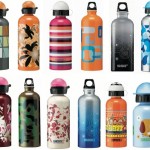Kicking the Bottle…Again

SIGG is offering a free bottle exchange, before October 31st.
You know those shiny metal water bottles you replaced your old NalgeneTM ones with? (Yeah, the ones you practically maxed out your credit cards to buy…) Well, it turns out that some of them –
most notably those made by so-called eco-friendly manufacturers SIGG and Gaiam – may be lined with a material that leaches bisphenol A (a.k.a. BPA), the nasty endocrine-disrupting, cancer-causing chemical you were trying to avoid in the first place! (Scroll down to read one of our older blog posts or visit ewg.org to learn more about BPA and how you can reduce your exposures.)The “good” news is that SIGG is offering a voluntary exchange program if you have a SIGG bottle that was made prior to August 2008. (Here’s how to tell whether or not you have one of the bottles in question.) You may also be able to return your bottle to any major retailer, such as EMS, in exchange for a new BPA-free version. Either way, make sure you act fast! The program ends on October 31st.
If, like me, all this information makes your head swim and leaves you thirsty for some unbiased suggestions about what kind of bottle you should (or shouldn’t) buy, “The ZRecs 2009 BPA-Free Water Bottle Showdown” includes reviews for nearly 40 alternatives.

 In 2008, Maine’s Governor John Baldacci signed into law an
In 2008, Maine’s Governor John Baldacci signed into law an 

